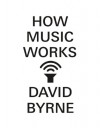Currently reading
Spam Nation: How the Demand for Cheap Prescription Drugs Is Endangering Americans, Threatening National Security and Enriching the Cybercrime Underworld
What Do You Do With a Chocolate Jesus?: An Irreverent History of Christianity
How Music Works
Embraced By The Light
 Note to God - find a better PR company!
Note to God - find a better PR company!Apparently God allows drunk drivers to kill so that they will go to jail and thus won't kill anyone else....
Sound like an uneducated idiot wrote this book? You'd be right.
The audiobook gives you the perverse pleasure of hearing the author's mindless monotone audition for dumbest sounding person in the world award.
In the Hitch Hikers Guide to the Galaxy, one character is strangled by his brain when attempting to write extremely bad poetry. I suspect this authors brain considered this plan of action many times during the writing of this.
Cascades of nonsense.
The Girl with All the Gifts
 I don’t know how it came to be that I have now read 2 Zombie books in a row - the whole shuffling zombie thing does nothing for me. Perhaps it is that these books - firstly, Raising Stony Mayhall and then this one, The Girl With All The Gifts are about zombies that have retained their humanity and the tales are about how their efforts to try and be human rather than embrace their animalistic instincts.
I don’t know how it came to be that I have now read 2 Zombie books in a row - the whole shuffling zombie thing does nothing for me. Perhaps it is that these books - firstly, Raising Stony Mayhall and then this one, The Girl With All The Gifts are about zombies that have retained their humanity and the tales are about how their efforts to try and be human rather than embrace their animalistic instincts.Raising Stony Mayhall reads mostly like a YA book and while it managed to keep me vaguely interested, it was at best mildly entertaining. But this book, The Girl With All The Gifts, is really great.
The characters are all well developed and evolve realistically throughout the story.
Basic plot revolves around a girl called Melanie who is a zombie but has retained her humanity. I'm not usually a fan of the breed of child characters who are the hero / heroine of the story, but Melanie is a perfect and believable mix of naïveté, resolve and strength. Along with a group of other similar children, she is kept in an institution where she spends the vast majority of her days chained to a chair and muzzled like a dog. As part of ongoing experiments to work out why these children are different to the bulk of humanity afflicted by the virus they are either schooled or dissected to be studied.
After an attack on the institution, her former captors are forced to have her travel with them seeking safety in the post apocalyptic world as it is possible she is the last remaining "specimen".
The tale flows at a good pace and while there are no real surprise twists or turns, the story builds to a really satisfying ending. As I neared the end, I was hoping the book wasn't going to end lamely having been so good all the way through and it was a relief that the author was able to come up with a good solid and not necessarily feel good ending.
Highly recommended - 4.5 out of 5.
Beautiful You: A Novel
 Probably my favourite Chuck book so far, which probably makes me a very very bad person!
Probably my favourite Chuck book so far, which probably makes me a very very bad person!If a movie was made that mirrored the book perfectly you would never watch it with either your parents or your children. The book begins with a rape (a rape in which only the victim is physically present by the way), written the way only Chuck can do. In those first few pages I caught myself a few times - oh my God did I actually smile at the way that line was written?!
There's a fair bit of over the top satire in these pages - from the obvious 50 Shades Of Grey, to more oblique similarities in the way women flock to the Beautiful You stores (an upmarket sex toy shop) in the same way Apple fans flock to new product launches. There's even an hilarious campaign proposed by Penny, the main character to introduce organic sex toys.
As with all Chuck tales, the story evolves at whatever pace it goddamn pleases, and while you can often guess what is just around the corner, there is the usual late emergences of WTF moments that left me either smiling or appalled or a mixture of both.
I've read a lot of reviews of this book which use the word "smut". While I can see why that word is often used to describe its contents, every "smutty" scene is relevant to the story and the tale couldn't be told without them. If you've read a Chuck book before then you already know you're going to be heading into bad territory, and this is admittedly as bad as it gets.
And Chuck finishes the book off with an hilariously corny final line, which in a typically WTF way, features a naked Happy Days era Ron Howard.
The Cipher
 I came across this book on a few "best horror" book lists. If this is one of the best I'd hate to read the worst.
I came across this book on a few "best horror" book lists. If this is one of the best I'd hate to read the worst.The actual premise of the book could have been a good short story with a better author.
The Three-Body Problem
 This is for the Audiobook version.
This is for the Audiobook version.A 3 star listen that could have been 4 or 5 star.
The Three Body Problem is the first part of a trilogy in which an alien planet, Trisolaris, intercepts a radio transmission from China. Trisolaris orbits 3 stars and due to the gravitational tug of war between those 3 stars, is subject to a violently unpredictable climate. Discovering Earth, Trisolaris plans to invade and claim the mild unchanging climate for themselves.
It took me at least an hour and a half of listening before I felt that that the story had actually begun as it goes through some back story that is only just relevant and could have been covered in a much shorter time.
When the book just gets on with the action its a great listen and has an interesting plot. The main problem with this book is that it is far better when its written as a sci-fi thriller than as the hard sci-fi it often bogs down in.
It can be a frustrating book to listen to due to some flaws that occasionally hobble the story. Large sections of the story are set in a computer game, which explains the history of Trisolaris and asks players to try to solve the riddle of predicting the varying climate of the planet. However these sections are long, mind numbingly tedious and repetitive.
There are also some problems with the internal logic of the story. The most obvious is why a group of traitors on Earth (a group of people who have grown disillusioned with the human race) conspire with the aliens to help them invade. They do this without even knowing one single detail about the alien race except for the fact that they exist. They also do this despite the fact that the very first message they get from the aliens is from a pacifist who tells them starkly and ominously not to answer any further communications as it would risk annihalation to humanity.
The last section of the book is also rather tedious and written in a dreamy style which stalls the momentum of the story. This part details the aliens plan to invade Earth (which due to the huge distance will be 450 years from now) and how they plan to disrupt human science so humanity won't have the technology to defend itself. This is also the part of the book where the hard sci-fi element is most prevalent as it describes the scientific principles and experiments they do. Just tell us what the gizmo is and what it does and get on with the story!!!! This is another part of the book that could have been written far more economically and with better characterisation.
One other point pertinent to the Audiobook version is the difficulty Westerners may have familiarising themselves with various characters in the first half of the book. Because the Chinese names are so unfamiliar it can be a little difficult to get a handle on who is who early on - but this does get easier as the story settles and the cast of characters solidifies.
As I said, this first book is first in a trilogy and I will go onto the next book as the story was interesting enough to keep me engaged, I'm hoping though that the second installment has a better editor.
A Short Stay in Hell
 Title is extreeeeeeeeeeeeeeemely ironic.
Title is extreeeeeeeeeeeeeeemely ironic.Short read and very thought provoking.
Clever alternate take on the concept of hell.
Dracula
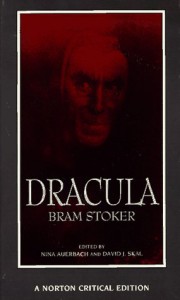 The story itself stands up fairly well considering how long ago it was written and Dracula himself is indeed worthy of being the first of the modern day vampires. Taking into account the "properness" and conservative sensibilities of the time in which the book was written the story is surprisingly menacing and creepy, although admittedly is quite mild compared to horror tales written in more modern times.
The story itself stands up fairly well considering how long ago it was written and Dracula himself is indeed worthy of being the first of the modern day vampires. Taking into account the "properness" and conservative sensibilities of the time in which the book was written the story is surprisingly menacing and creepy, although admittedly is quite mild compared to horror tales written in more modern times.Dracula is told in a style common of the age in which it was written - that of a collection of letters, journals and telegrams which tell the story. The "properness" of the interactions and speech of the characters has a quaint old fashioned charm.
At 2 or 3 points, the story gets bogged down and spends too much time treading water before getting to the next plot point. At least 10% of the book could have been edited out and nothing important would have been left out. Towards the end I was silently shouting at them to just get up and go kill him and stop talking about it!
Still, apart from that it could have been 99.9% worse and still possessed more worth than Twilight.....
Holy Cow: A Modern-Day Dairy Tale
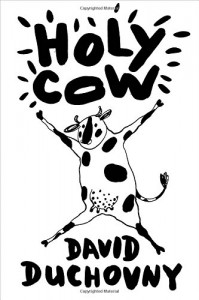 Slightly amusing. Slightly cute. Many bad puns. Some mild preaching about the way humans treat the world. An actor writes a story that tries to be a little too clever for its own good at times.
Slightly amusing. Slightly cute. Many bad puns. Some mild preaching about the way humans treat the world. An actor writes a story that tries to be a little too clever for its own good at times.Elsie, a cow, one day discovers what fate awaits a farm cow - the slaughterhouse. She sets off with a pig and a turkey on a voyage to India, because she is told cows are revered there.
Never great, never entirely bad, Holy Cow is an opportunity for self indulgence by a successful actor who perhaps has long harboured a dream to write a book. He can now cross that off his list, and at least be comforted by knowing there's worse out there than this.
An ok light read.
Who Goes There?
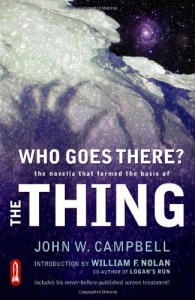 What a mess of a book. Story lurches from one scene to the next and characters and scenes change in the space of a sentence. Things happen with no explanation prior or afterwards.
What a mess of a book. Story lurches from one scene to the next and characters and scenes change in the space of a sentence. Things happen with no explanation prior or afterwards.Basic story consists of a bunch of cookie cutter Characters standing round asking each other if they're a monster or accusing the others of being a monster after they dig up an alien on Antartica. How anyone made sense enough of this story as it is written to go on to think it was worth making a movie out of is remarkable.
Hard-Boiled Wonderland and the End of the World
 The first HM book that didn't draw me in and engage me. It has that familiar weird charm and hey this book even has an ending that I'm going to pass as a satisfying resolution (Murakami is often happy to leave loose ends reeeaaallly loose).
The first HM book that didn't draw me in and engage me. It has that familiar weird charm and hey this book even has an ending that I'm going to pass as a satisfying resolution (Murakami is often happy to leave loose ends reeeaaallly loose).I still really enjoyed HM's writing and it kept me interested enough to get through the book in a week or so but putting fantasy aside, I couldn't buy into the insufficiently fleshed out story about the Data War between the Calcutecs and the Semiotecs. It was all just too vague and ethereal to me. This and the underground world of the Inklings that seemed to have no real point kept my engagement at arms length. I floated through this part of the story looking for something solid to hang onto but it was just all so wispy and aloof.
I finished the book feeling like maybe I'd rushed through reading it and I'd missed something blindingly obvious. I'll probably revisit this one in a few years to see if the second times a charm.
Banished: Surviving My Years in the Westboro Baptist Church
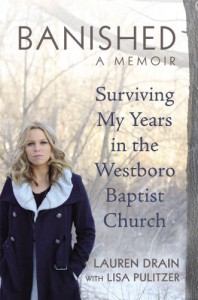 I felt like I needed to take a long shower after finishing this book. I considered abandoning it several times as it continually made my skin crawl. It doesn't help that the "victim" of the book is very unlikeable. The title "Surviving My Years in the Westboro Baptist Church" suggests that Lauren Drain was a poor girl trapped in the clutches of this group of evil loonies, whereas she comes across as almost defensive of the heinous behaviour of the WBC often going as far as to attempt to justify it. Its as if her only issue is that she was "banished" from the church rather than its horrid outlook on the world.
I felt like I needed to take a long shower after finishing this book. I considered abandoning it several times as it continually made my skin crawl. It doesn't help that the "victim" of the book is very unlikeable. The title "Surviving My Years in the Westboro Baptist Church" suggests that Lauren Drain was a poor girl trapped in the clutches of this group of evil loonies, whereas she comes across as almost defensive of the heinous behaviour of the WBC often going as far as to attempt to justify it. Its as if her only issue is that she was "banished" from the church rather than its horrid outlook on the world.Several times during the book she tells of how "the Holy Ghost" told someone in authority what to do - but completely without irony, her tone is matter of fact and accepting. She describes her thrill of picketing military funerals and telling people they were going to burn in hell by saying "there was so much power in telling someone they were unworthy". Years later, she describes one teenager who refused to accept the WBC's teachings on face value as a trouble maker, saying "He'd always been a trouble maker,saying something absurd like there's no proof" in the middle of bible studies.
At one point in the book she says that her and her fellow hate mongers were "free thinking, highly intelligent individuals......very educated, well spoken and informed". And she's serious.
Once she is banished, she is still crazy enough to continue to embrace her religion, with the disclaimer that she no longer believes in picketing funerals or victimising people. My skin crawled all the way through the book.
I could never read this book again - it saps your optimism and your faith in humanity.
So You've Been Publicly Shamed
 Jon Ronson books are typically a collection of amusing anecdotes about the lunatic fringe or bizarre situations. This book has a more sinister edge as it delves into the mire of the internet mob mentality. The narration is delivered with the usual seemingly naive earnestness that Jon is known for but in this book there is a sympathy for the victims of public shaming and disgust for the perpetrators that he seems honour bound to step back from straddling the line of journalistic objectivity.
Jon Ronson books are typically a collection of amusing anecdotes about the lunatic fringe or bizarre situations. This book has a more sinister edge as it delves into the mire of the internet mob mentality. The narration is delivered with the usual seemingly naive earnestness that Jon is known for but in this book there is a sympathy for the victims of public shaming and disgust for the perpetrators that he seems honour bound to step back from straddling the line of journalistic objectivity.The stories here stir you up as you hear of people's lives being ruined by the fury of an Internet of pathetic people hiding behind a keyboard. The subject of the first story probably deserved his shaming but stories of some of the poor people that follow make you sick as a private conversation or failed attempt at a joke goes viral and their lives and careers are permanently changed.
Does the Internet champion free speech or is it just a mouthpiece for cheap speech?
Way Station (A Collier Nucleus Science Fiction Classics)
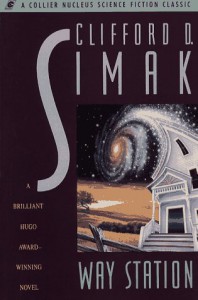 Like a lot of books, the story begins with an interesting principle, that aliens are using Earth as a kind of interstellar "airport" and one man, a civil war survivor has been chosen to oversee their facility. He only ages when outside the facility the aliens have built inside his old farmhouse.
Like a lot of books, the story begins with an interesting principle, that aliens are using Earth as a kind of interstellar "airport" and one man, a civil war survivor has been chosen to oversee their facility. He only ages when outside the facility the aliens have built inside his old farmhouse. There are a lot of problems with the internal logic of the story - e.g.. aliens of varying species can breathe our air with no problem, characters meeting aliens with no real surprise or shock or awe etc.
Apart from the interesting premise, the book meekly meanders along until the feel good optimistic ending of no real substance.
The story has a certain old fashioned charm but lacks subtlety (for example - what is going to happen to Lucy, one of the main characters is obvious half way through the tale). Children interested in sci-fi might like this story as long as they are not expecting a lot of action and excitement. I can't imagine an adult enjoying this story unless they have very very mellow taste and an uncritical mind. The book never is guilty of being terrible, just a bit lame.
The Inverted World
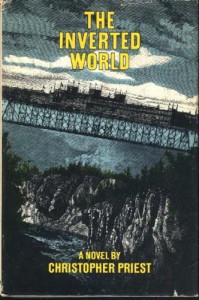 Audible guided review:
Audible guided review:"Underwhelming-did Priest only write 1 good novel?"
Would you try another book from Christopher Priest and/or Steven Cree?
Christopher Priest books are a mixed bag - The Prestige was excellent, but the 2 others I've read are mediocre.
What was most disappointing about Christopher Priest’s story?
The premise is intriguing but the story is boring and the ending is really soft and lame.
What didn’t you like about Steven Cree’s performance?
The thick Scottish accent is really off-putting. I kept expecting him to start singing a Proclaimers song.....
You didn’t love this book... but did it have any redeeming qualities?
I think the author wrote this book for the right reasons - for art's sake - but its just a boring and unsatisfying tale.
Revival
 It's been a while since King has written a book this good from start to finish.
It's been a while since King has written a book this good from start to finish.The story follows Jamie Morton, whom we meet as a young boy and he finds his life interconnected with a young pastor named Charles Jacobs with a fascination for the power of electricity. After tragedy strikes the young Jacobs, he understandably loses his faith and leaves town but the lives of Jamie and Charles will be intertwined from that time on. Jamie grows up to become a musician who succumbs to drug addiction, while ex-Pastor Jacobs goes on to experiment with the "healing" powers of electricity. Jacobs believes he can heal a variety of conditions and his experiments grow larger and more daring as his life goes on, but as Jamie gets drawn back into his old pastors's life, he begins to learn that the cures Jacobs performs come with consequences.
The story moves along quite briskly and there's no wasted time with unnecessary narrative as a few of the last King books have been guilty of (except Under The Dome). The narration is understated and laid back - the only thing that threw me at the beginning of the book was that the narration is performed by an older man - until silly me realised the book was written from the perspective of an old man.
What makes a great Stephen King book is when you read a scene and you can imagine King sitting at his computer grinning evilly at what he has just typed. There's a few of those type of scenes in Revival, my favourite being a re-worked version of Happy Birthday sung to Jamie in a dream. Something happened!
I liked that the "bad guy" of the story, Charles Jacobs isn't the stereotypical villain. He's a man beset with tragedy while only a young man, and while he cynically "preys" on the gullible to fund his lifelong experiments with electricity and healing, its in order to find out the answer to one of life's great questions - what waits for us after death.
For me, what's revealed at the end of Charles Jacobs' quest is where the real boogie man of the story had been waiting for us all along.
The Book of Strange New Things: A Novel
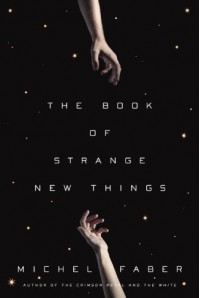 There were a few times during the reading of this book that I felt like abandoning it. I pushed on hoping this very flawed book would reward me with a decent ending, but unfortunately not.
There were a few times during the reading of this book that I felt like abandoning it. I pushed on hoping this very flawed book would reward me with a decent ending, but unfortunately not. There are themes and ideas that could have made for an intriguing, philosophical and smart story but they all lead to the same unsatisfactory lame end.
I had no warmth for Peter, a reformed alcoholic and petty criminal who is now a Christian minister who volunteers to go to a far away planet to preach to the aliens/ natives there. He leaves behind his devoted wife Bea and the only way they can communicate is via a crude text based email. Peter is just meek, mild and bland and comes across a wimp at a military-like base run by an organisation called USIC which has an undefined (hinting at sinister) reason for "colonising" the planet known as Oasis.
Peter arrives to find 2 previous ministers to the natives seemed to go mad and had literally walked off into the wilderness after extended periods of time spent with the natives, who have heard about and revere Jesus and the Bible, which they call The Book of Strange New Things.
Peter spends extended periods of time with the natives, initially overjoyed at the ecstatic welcome they give him and settles in to try and minister to them and learn about them and close the language gap between them.
The natives are a mysterious people who are inscrutable on the surface, private, stoic and noble. I liked them and it seems obvious that their naive and childlike fascination about the Bible and Jesus is directly tied to its promises of immortality. Sadly, the author doesn't bother to either end their quest with either disappointment or triumph - they are just left hanging and in the worst of the books many unresolved loose ends, Peter's favourite native is injured and its fate is left unknown and discarded in a hospital room at the time of the books premature end.
So many things which seem integral to the story go either unexplained or are glossed over.
Early in his time on this new planet Peter finds his camera won't take pictures and he remembers he was warned photography would be "futile". No explanation as to why is offered. Peter laments this several times as he tries to communicate with his wife but never thinks to actually ask anyone about it nor does the author bother explaining it.
The natives are bought regular supplies of human drugs (a random mix of painkillers and antibiotics usually). In exchange for this, the natives manufacture food for the humans. Not once does Peter ask WHY they want the drugs or ask about how they are used. At the very end of the book one of the USIC workers makes a point of directly asking the natives about the drugs but by then the story is about to end (lamely) and the question goes unanswered anyway.
There are several really clumsy plot setups. At one point after a visit to the natives, Peter returns to base to be told a colleague has died. He's not told how nor does he ask but this sets up a scene in which Peter delivers a long funeral speech which ends up being pointless / irrelevant to the story anyway. Later another death happens and inexplicably Peter is dragged in to a mortuary to look at the body (he didn't even know the person who had died) just so people could gather to have a conversation with him. So clunky....
There are several early hints of USIC censoring information from Earth but Peter never goes to any serious lengths to investigate.
Meanwhile his wife back on Earth begins to provide vague reports of social decay but never explains what is happening , how or why. It's the lack of detail in this book that brings it down - all the plot points seemed slapped down haphazardly without any apparent consideration of plausibility or thought of credibility.
This book could have been anything but fizzles out prematurely leaving literally none of the major (or minor) plot lines resolved OR even vaguely having a go at suggesting answers to the big philosophical themes it lamely explores.


